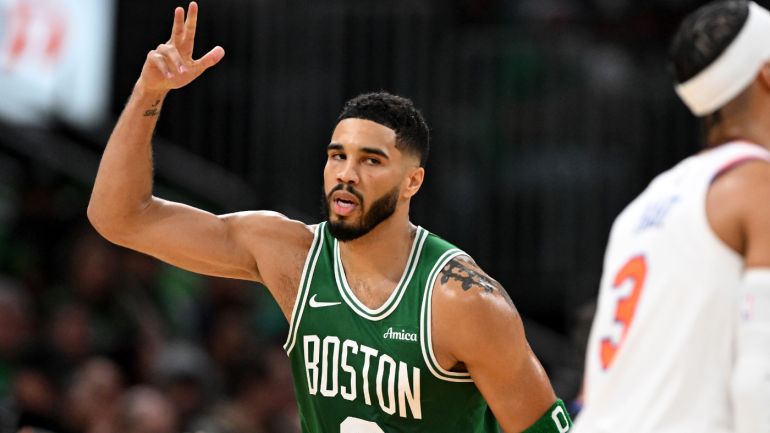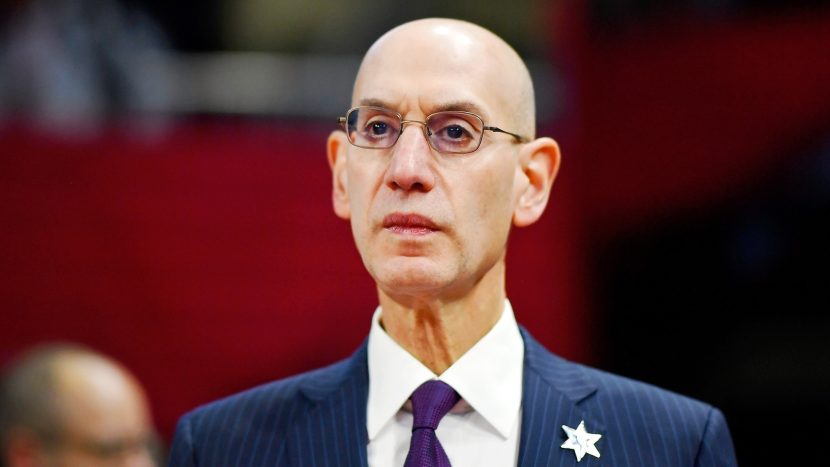Getty Images Some people really don’t like that the Boston Celtics are shooting 51 3-pointers a game. Some people are upset that the league-wide 3-point rate, after appearing to peak in 2021-22, has hit a new high this season. NBA commissioner Adam Silver, though, said Tuesday that, while style of play has been a topic […]


Some people really don’t like that the Boston Celtics are shooting 51 3-pointers a game. Some people are upset that the league-wide 3-point rate, after appearing to peak in 2021-22, has hit a new high this season. NBA commissioner Adam Silver, though, said Tuesday that, while style of play has been a topic of discussion at the league office, he’s not sure the volume of 3s attempted is a problem and he does not think the 3-point line needs to be moved.
“I would not reduce it to a so-called 3-point shooting issue,” Silver told a group of reporters in Las Vegas, via ESPN’s Tim Bontemps. “I think we look more holistically at the skill level on the floor, the diversity of offense, the fan reception to the game, all of the above.
“I think the game is in a great place. I love watching the games, and I think we have some of the most skilled athletes in the world competing — and it’s unfair, I think, to the players to lump them into categories as 3-point shooters or a midrange shooter or big man playing under the basket. It’s an amazing game. Having said that, we’re constantly having discussions about whether there are ways to improve stylistically the game on the floor.”
Silver said that the league needs to pay attention to the notion that a portion of its audience feels that offenses around the NBA “look sort of cookie-cutter and teams are copying each other.” He framed it as an issue of offensive diversity, not simply 3-point volume.
He added: “Historically, at times, we’ve moved the 3-point line. I don’t think that’s a solution here because then, I think when we look at both the game and the data, I think that may not necessarily do more midrange jumpers, if that’s what people want, but more clogging under the basket.”
It is worth noting that Silver does not himself endorse the notion that offenses are too similar. Pardon the speculation, but I suspect this is because he knows this is a perception issue, not one that reflects what is actually happening on the court.
Yes, teams are shooting lots of 3s. But what about all the things that happen before the 3s go up? The Memphis Grizzlies completely revamped their offense this season, deemphasizing pick-and-roll play in favor of off-ball screens, isolation attacks and cuts. The Cleveland Cavaliers have the league’s best record because they’ve unleashed their 6-foot-11 big man as a playmaker and confused opponents with timely cuts. Teams still run a lot of spread pick-and-rolls and hunt mismatches, but, increasingly, they want to balance that with other actions and be unpredictable. The ways in which the Golden State Warriors and Denver Nuggets do that are completely different, a reflection of the distinct talents of Stephen Curry and Nikola Jokic.
Relative 3-point volume is a horrible measure of offensive diversity. The Grizzlies and the Dallas Mavericks take almost an identical number of 3s on a per-possession basis, but they are not particularly similar stylistically.
Also worth noting: The NBA hasn’t traded exciting drives and dunks for long bombs. It has traded long 2s for 3s. Star players still take off-the-dribble midrange jumpers, but role players don’t spot up 18 feet from the basket anymore. There is more open space for athletic players to, you know, actually use their athleticism.
There is a notion that the league is so in love with the 3-point shot players are routinely turning down layups in transition in order to stand at the 3-point line. Years ago, one member of an NBA coaching staff told me that his team told shooters to sprint to the corners because doing so might create a dunk for a teammate.
On a recent episode of the Bill Simmons podcast, analyst Kirk Goldsberry said that, in 2019, Silver asked him to present some of his research and ideas about 3-point shooting to the league. The competition committee discussed looking at different 3-point lines in the G League. When the idea of entirely removing the corner 3 came up, “I think it was Brad Stevens, who was on the competition committee, who was like, ‘Hell no, you’ll never see a slam dunk again, this is going to ruin spacing,'” Goldsberry said.
Famously, early in his first season as the coach of the Celtics, Joe Mazulla said, “I love 3-pointers. I like math.” Much less famously, he immediately clarified: “I like open 3s. I like space.” Last season, after Boston scored 64 points in the paint in a win against the Philadelphia 76ers, Mazzulla said, “I don’t love 3s. I love great shots.” The Celtics’ philosophy, he said, is to take what the defense gives them and “take the best shot.”
The area around the rim is still extremely valuable real estate. If you listen to coaches’ press conferences or even just their in-game interviews on national broadcasts, you will hear them talk about getting downhill and touching the paint ad nauseam. In order to do that, though, you need space, and, with lineups getting bigger and officiating changes making the game more physical, it seems that spacing is only going to become more paramount, not less. The NBA might have a PR problem at the moment with all these 3s, but it’s a good thing that Silver isn’t proposing a “fix” that would clog up the paint and make the product worse.














